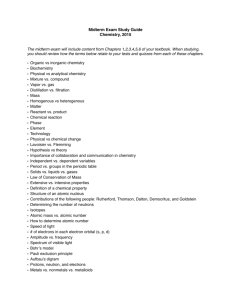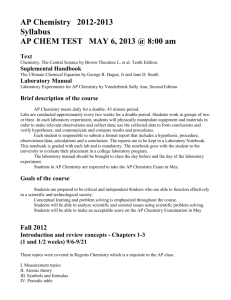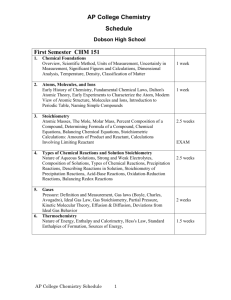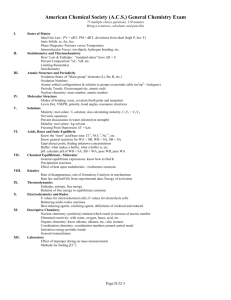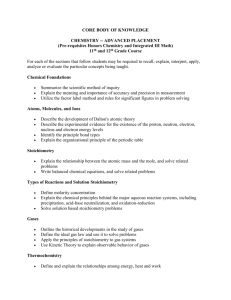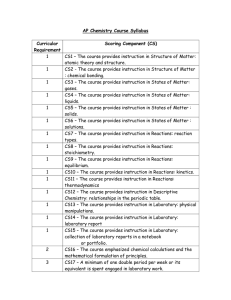B_and_L_10th_edition
advertisement
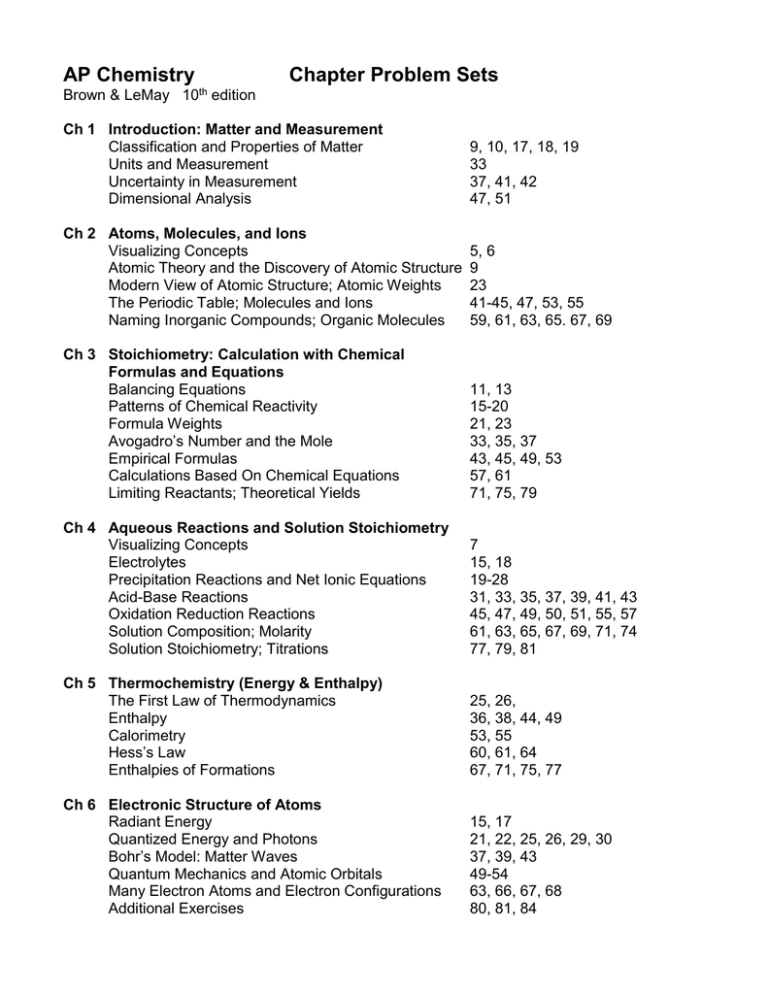
AP Chemistry Chapter Problem Sets Brown & LeMay 10th edition Ch 1 Introduction: Matter and Measurement Classification and Properties of Matter Units and Measurement Uncertainty in Measurement Dimensional Analysis 9, 10, 17, 18, 19 33 37, 41, 42 47, 51 Ch 2 Atoms, Molecules, and Ions Visualizing Concepts Atomic Theory and the Discovery of Atomic Structure Modern View of Atomic Structure; Atomic Weights The Periodic Table; Molecules and Ions Naming Inorganic Compounds; Organic Molecules 5, 6 9 23 41-45, 47, 53, 55 59, 61, 63, 65. 67, 69 Ch 3 Stoichiometry: Calculation with Chemical Formulas and Equations Balancing Equations Patterns of Chemical Reactivity Formula Weights Avogadro’s Number and the Mole Empirical Formulas Calculations Based On Chemical Equations Limiting Reactants; Theoretical Yields 11, 13 15-20 21, 23 33, 35, 37 43, 45, 49, 53 57, 61 71, 75, 79 Ch 4 Aqueous Reactions and Solution Stoichiometry Visualizing Concepts Electrolytes Precipitation Reactions and Net Ionic Equations Acid-Base Reactions Oxidation Reduction Reactions Solution Composition; Molarity Solution Stoichiometry; Titrations 7 15, 18 19-28 31, 33, 35, 37, 39, 41, 43 45, 47, 49, 50, 51, 55, 57 61, 63, 65, 67, 69, 71, 74 77, 79, 81 Ch 5 Thermochemistry (Energy & Enthalpy) The First Law of Thermodynamics Enthalpy Calorimetry Hess’s Law Enthalpies of Formations 25, 26, 36, 38, 44, 49 53, 55 60, 61, 64 67, 71, 75, 77 Ch 6 Electronic Structure of Atoms Radiant Energy Quantized Energy and Photons Bohr’s Model: Matter Waves Quantum Mechanics and Atomic Orbitals Many Electron Atoms and Electron Configurations Additional Exercises 15, 17 21, 22, 25, 26, 29, 30 37, 39, 43 49-54 63, 66, 67, 68 80, 81, 84 Ch 7 Periodic Properties of the Elements Periodic Table; Effective Nuclear Charge Atomic and Ionic Radii Ionization Energies; Electron Affinities Properties of Metals and Non Metals Group Trends in Metals and Non Metals Additional Exercises 9, 11, 12 21, 23, 25, 26, 28, 29, 32 35, 36, 38, 41, 43-47, 49-51 56, 58, 59, 63 66-71 84 Ch 8 Basic Concepts of Chemical Bonding Visualizing Concepts Ionic Bonding Covalent Bonding Lewis Structures; Resonance Structures Exceptions to the Octet Rule Bond Enthalpies 6 15, 18, 20, 21, 26, 27 40, 44 45, 46-54 61-63 65-68, 70, 72 Ch 9 Molecular Geometry and Bonding Theories Molecular Shapes; the VSEPR Model Polarity of Polyatomic Molecules Orbital Overlap; Hybrid Orbitals Multiple Bonds 19, 21, 22-24, 27-30 35-37 45-48 51-54, 58 Ch 10 Gases Gas Characteristics; Pressure The Gas Laws The Ideal-Gas Equation Further Applications of the Ideal-Gas Equation Partial Pressures Kinetic-Molecular Theory; Graham’s Law Non-Ideal Gas Behavior 10, 17, 21, 22 24, 26 28, 30, 31, 33, 37, 39 47, 49, 53 59, 61, 65 69, 70, 73, 75, 77, 78 81, 82, 85 Ch 11 Intermolecular Forces Intermolecular Forces Viscosity and Surface Tension Changes of State Vapor Pressure and Boiling Point Phase Diagrams 14-20, 23, 25-27 31, 32 37-41 45, 46 51, 52, 54, 56 Ch 12 Modern Materials This chapter is not covered in the AP curriculum Ch 13 Properties of Solutions The Solution Process Saturated Solutions; Factors Affecting Solubility Concentrations of Solutions Colligatives Properties 13, 14 24, 28 33, 35, 37, 41, 43, 48, 49 60, 62, 68, 70, 73 Ch 14 Kinetics Reactions Rates Rate Laws Change of Concentration with Time Temperature and Rate Reaction Mechanisms Catalysis 14 21, 23, 24, 29, 30, 32 35, 36, 39, 40, 42, 43 47, 50, 53, 55, 58 59-61, 65, 67 69, 70, 71 Ch 15 Equilibrium Equilibrium; the Equilibrium Constant Calculating Equilibrium Constants Applications of Equilibrium Constants Le Chatelier’s Principle Additional Exercises 14, 15, 19, 21, 22, 24 28-30, 31-33 37-38, 41-44, 49 51-56 58, 62, 68, 72, 73 Ch 16 Acid-Base Equilibria Arrhenius and Bronsted-Lowry Acids and Bases 15-17, 21, 26 Autoionization of Water 29 pH Scale 35, 37, 39 Strong Acids and Bases 42, 43, 45, 47, 48 Weak Acids 51, 53, 55-57, 60-62 Weak Bases 75, 76 Ka and Kb Relationship; Acid-Base Properties of Salts 79-81, 84-86 Acid-Base Character and Chemical Structure 93, 94 Lewis Acids and Bases 101, 102 Ch 17 Additional Aspects of Aqueous Equilibria Common-Ion Effect Buffers Titrations Solubility Equilibria and Factors Affecting Solubility Precipitation:Qualitative Analysis Ch 18 Chemistry of the Environment 11, 13, 14-16 18, 20-22, 24-26, 27, 29 33, 35, 39, 41 45, 47, 53 61, 62, 65, 66 This chapter is not covered in the AP curriculum Ch 19 Chemistry Thermodynamics (Entropy & Gibbs Free Energy) Spontaneous Processes 7-9 Entropy and the Second Law of Thermodynamics 20, 21 The Molecular Interpretation of Entropy 28, 30, 38, 40 Entropy Changes in Chemical Reactions 48 Gibbs Free Energy 49, 51, 53, 54, 56, 58, 63, 66 Free Energy and Equilibrium 71, 76, 79 Additional Exercises 82, 87, 88, 89, 90, 92 Ch 20 Electrochemistry Visualizing Concepts Oxidation States Balancing Oxidation-Reduction Reactions Voltaic Cells Cell EMF under Standard Conditions Strengths of Oxidizing and Reducing Agents Free Energy and Redox Reactions Cell EMF under Non-standard Conditions 6, 7 9,11, 13, 14 17, 19, 20 23, 24 25 a,b, 27, 29, 31, 36 42, 43, 44 46, 49, 51, 52 56, 57, 59, 60, 62, 64 Ch 21 Nuclear Chemistry Radioactivity Patterns of Nuclear Stability Nuclear Transmutations Rates of Radioactive Decay Energy Changes in Nuclear Reactions Effects and Uses of Radioisotopes 7, 9, 11, 13 17, 19, 21, 23 25, 27, 29 33, 35 43 57, 58 Ch 22 Chemistry of the Nonmetals This chapter is not covered in the AP curriculum Ch 23 Metals and Metallurgy This chapter is not covered in the AP curriculum Ch 24 Coordination Compounds We will cover this material through the Reaction Predictions chapter of the UEHB Ch 25 Organic and Biological Chemistry Visualizing Concepts 3 Introduction to Organic Compounds; Hydrocarbons 8 We will cover this material through the Reaction Predictions chapter of the UEHB and alternate resources Note: I reserve the right to change the problems (in the above lists) throughout the course.
